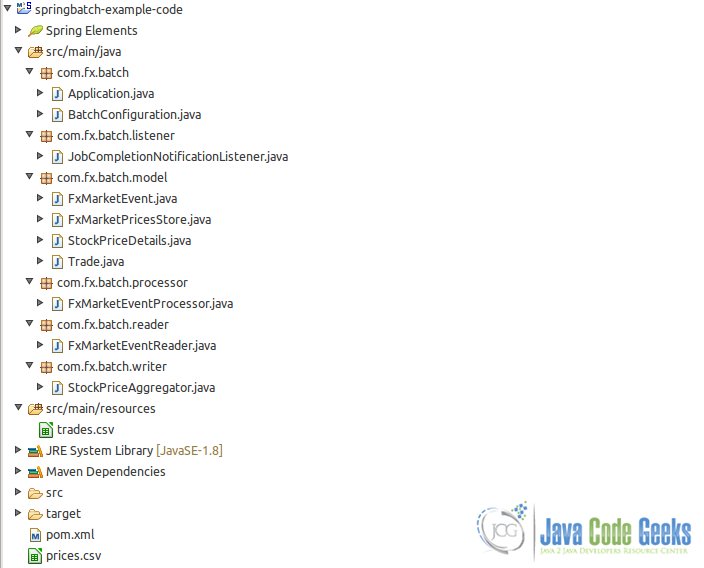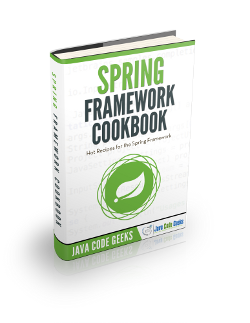Spring Batch ETL Job Example
Through this article, we are going to demonstrate an ETL use case leveraging the advantages of Spring Batch, A typical batch program generally reads a large number of records from a database, file, or queue, processes the data in some fashion, and then writes back data in a modified form.
The main advantage of batch applications is that they do not require any manual intervention. As a result, they can be scheduled to run at times when resources aren’t being utilized.
As an example, We will look at an ETL tool which runs in batch mode to calculate the financial stock market prices (Open, Low, High, Close). Huge financial stock market trades logs need to be parsed on a daily basis to fetch the required useful information. The input files are extracted and processed to obtain the required information, and the output data gets loaded to a CSV files. This whole process is carried out in batch mode.
1. Project Environment
- Spring Boot 1.3.3.RELEASE
- Apache Maven 3.0.5
- JDK 1.8
- Eclipse 4.4 (Luna)
2. Project Structure
3. Dependencies
We have the following dependencies inside our below POM file.
pom.xml:
<?xml version="1.0" encoding="UTF-8"?> <project xmlns="http://maven.apache.org/POM/4.0.0" xmlns:xsi="http://www.w3.org/2001/XMLSchema-instance" xsi:schemaLocation="http://maven.apache.org/POM/4.0.0 http://maven.apache.org/xsd/maven-4.0.0.xsd"> <modelVersion>4.0.0</modelVersion> <groupId>org.springframework</groupId> <artifactId>springbatch-example-code</artifactId> <version>0.1.0</version> <parent> <groupId>org.springframework.boot</groupId> <artifactId>spring-boot-starter-parent</artifactId> <version>1.3.3.RELEASE</version> </parent> <properties> <java.version>1.8</java.version> </properties> <dependencies> <dependency> <groupId>org.springframework.boot</groupId> <artifactId>spring-boot-starter-batch</artifactId> </dependency> </dependencies> <build> <plugins> <plugin> <groupId>org.springframework.boot</groupId> <artifactId>spring-boot-maven-plugin</artifactId> </plugin> </plugins> </build> </project>
4. Reader
FxMarketEventReader is an ItemReader that reads lines from input CSV file trades.csv which defined by setResource(Resource), then skip the file header at the start of a file using setLinesToSkip(int linesToSkip), after that map each line to an item FxMarketEvent using setLineMapper(LineMapper<T> lineMapper).
FxMarketEventReader.java:
package com.fx.batch.reader;
import org.springframework.batch.item.file.FlatFileItemReader;
import org.springframework.batch.item.file.mapping.BeanWrapperFieldSetMapper;
import org.springframework.batch.item.file.mapping.DefaultLineMapper;
import org.springframework.batch.item.file.transform.DelimitedLineTokenizer;
import org.springframework.core.io.ClassPathResource;
import com.fx.batch.model.FxMarketEvent;
/**
* The Class FxMarketEventReader.
*
* @author ashraf
*/
public class FxMarketEventReader extends FlatFileItemReader<FxMarketEvent> {
public FxMarketEventReader() {
//Set input file
this.setResource(new ClassPathResource("trades.csv"));
//Skip the file header line
this.setLinesToSkip(1);
//Line is mapped to item (FxMarketEvent) using setLineMapper(LineMapper)
this.setLineMapper(new DefaultLineMapper<FxMarketEvent>() {
{
setLineTokenizer(new DelimitedLineTokenizer() {
{
setNames(new String[] { "stock", "time", "price", "shares" });
}
});
setFieldSetMapper(new BeanWrapperFieldSetMapper<FxMarketEvent>() {
{
setTargetType(FxMarketEvent.class);
}
});
}
});
}
}
trades.csv:
stock,time,price,shares JHX,09:30:00.00,57,95 JNJ,09:30:00.00,91.14,548 OPK,09:30:00.00,8.3,300 OPK,09:30:00.00,8.3,63 OMC,09:30:00.00,74.53,100 OMC,09:30:00.00,74.53,24 TWTR,09:30:00.00,64.89,100 TWTR,09:30:00.00,64.89,25 TWTR,09:30:00.00,64.89,245 TWTR,09:30:00.00,64.89,55 USB,09:30:00.00,39.71,400 USB,09:30:00.00,39.71,359 USB,09:30:00.00,39.71,41 USB,09:30:00.00,39.71,259 USB,09:30:00.00,39.71,100 VALE,09:30:00.00,14.88,900 VALE,09:30:00.00,14.88,1000 VALE,09:30:00.00,14.88,100 VALE,09:30:00.00,14.88,1000 VALE,09:30:00.00,14.88,260 VALE,09:30:00.00,14.88,100 BSBR,09:30:00.00,5.87,1100 BSBR,09:30:00.00,5.87,800 BRK.B,09:30:00.00,118.35,422
5. Processor
FxMarketEventProcessor is an ItemProcessor, takes FxMarketEvent as an input and converts it to Trade as an output. Although, It’s possible to return the same or different type than the one provided, returning null indicates that the item should not be continued to be processed.
FxMarketEventProcessor.java:
package com.fx.batch.processor;
import org.slf4j.Logger;
import org.slf4j.LoggerFactory;
import org.springframework.batch.item.ItemProcessor;
import com.fx.batch.model.FxMarketEvent;
import com.fx.batch.model.Trade;
/**
* The Class FxMarketEventProcessor.
*
* @author ashraf
*/
public class FxMarketEventProcessor implements ItemProcessor<FxMarketEvent, Trade> {
private static final Logger log = LoggerFactory.getLogger(FxMarketEventProcessor.class);
@Override
public Trade process(final FxMarketEvent fxMarketEvent) throws Exception {
final String stock = fxMarketEvent.getStock();
final String time = fxMarketEvent.getTime();
final double price = Double.valueOf(fxMarketEvent.getPrice());
final long shares = Long.valueOf(fxMarketEvent.getShares());
final Trade trade = new Trade(stock, time, price, shares);
log.trace("Converting (" + fxMarketEvent + ") into (" + trade + ")");
return trade;
}
}
6. Writer
StockPriceAggregator is an ItemWriter that aggregates the trading day stocks prices to calculates the Open, Low, High and Close for each stock, then update the FxMarketPricesStore.
StockPriceAggregator.java:
package com.fx.batch.writer;
import java.util.List;
import org.slf4j.Logger;
import org.slf4j.LoggerFactory;
import org.springframework.batch.item.ItemWriter;
import org.springframework.beans.factory.annotation.Autowired;
import com.fx.batch.model.FxMarketPricesStore;
import com.fx.batch.model.StockPriceDetails;
import com.fx.batch.model.Trade;
/**
* The Class StockPriceAggregator.
*
* @author ashraf
*/
public class StockPriceAggregator implements ItemWriter<Trade> {
@Autowired
private FxMarketPricesStore fxMarketPricesStore;
private static final Logger log = LoggerFactory.getLogger(StockPriceAggregator.class);
@Override
public void write(List<? extends Trade> trades) throws Exception {
trades.forEach(t -> {
if (fxMarketPricesStore.containsKey(t.getStock())) {
double tradePrice = t.getPrice();
StockPriceDetails priceDetails = fxMarketPricesStore.get(t.getStock());
// Set highest price
if (tradePrice > priceDetails.getHigh()) {
priceDetails.setHigh(tradePrice);
}
// Set lowest price
if (tradePrice < priceDetails.getLow()) {
priceDetails.setLow(tradePrice);
}
// Set close price
priceDetails.setClose(tradePrice);
} else {
log.trace("Adding new stock {}", t.getStock());
fxMarketPricesStore.put(t.getStock(),
new StockPriceDetails(t.getStock(), t.getPrice(), t.getPrice(), t.getPrice(), t.getPrice()));
}
});
}
}
7. Listener
JobCompletionNotificationListener is a JobExecutionListener that provides a callback function afterJob(JobExecution jobExecution) to load the stocks prices into CSV file prices.csv after the ETL Job completion.
JobCompletionNotificationListener.java:
package com.fx.batch.listener;
import java.io.BufferedWriter;
import java.nio.file.Files;
import java.nio.file.Path;
import java.nio.file.Paths;
import org.slf4j.Logger;
import org.slf4j.LoggerFactory;
import org.springframework.batch.core.BatchStatus;
import org.springframework.batch.core.JobExecution;
import org.springframework.batch.core.listener.JobExecutionListenerSupport;
import org.springframework.beans.factory.annotation.Autowired;
import com.fx.batch.model.FxMarketPricesStore;
import com.fx.batch.model.StockPriceDetails;
/**
* The Class JobCompletionNotificationListener
*
* @author ashraf
*/
public class JobCompletionNotificationListener extends JobExecutionListenerSupport {
private static final Logger log = LoggerFactory.getLogger(JobCompletionNotificationListener.class);
private static final String HEADER = "stock,open,close,low,high";
private static final String LINE_DILM = ",";
@Autowired
private FxMarketPricesStore fxMarketPricesStore;
@Override
public void afterJob(JobExecution jobExecution) {
if (jobExecution.getStatus() == BatchStatus.COMPLETED) {
log.trace("Loading the results into file");
Path path = Paths.get("prices.csv");
try (BufferedWriter fileWriter = Files.newBufferedWriter(path)) {
fileWriter.write(HEADER);
fileWriter.newLine();
for (StockPriceDetails pd : fxMarketPricesStore.values()) {
fileWriter.write(new StringBuilder().append(pd.getStock())
.append(LINE_DILM).append(pd.getOpen())
.append(LINE_DILM).append(pd.getClose())
.append(LINE_DILM).append(pd.getLow())
.append(LINE_DILM).append(pd.getHigh()).toString());
fileWriter.newLine();
}
} catch (Exception e) {
log.error("Fetal error: error occurred while writing {} file", path.getFileName());
}
}
}
}
8. Configuring and Running a Job
8.1. Job Java Configuration
Batch application java based configuration has two main components the @EnableBatchConfiguration annotation and two builders (JobBuilderFactory, StepBuilderFactory).
The @EnableBatchConfiguration provides a base configuration for building batch jobs. Within this base configuration, an instance of StepScope and JobScope so your beans inside steps can have @Scope("step") and @Scope("job") respectively. Also, there is a number of beans made available to be autowired:
JobRepositoryJobLauncherJobRegistryPlatformTransactionManagerJobBuilderFactoryStepBuilderFactory
BatchConfiguration.java:
package com.fx.batch;
import org.springframework.batch.core.Job;
import org.springframework.batch.core.JobExecutionListener;
import org.springframework.batch.core.Step;
import org.springframework.batch.core.configuration.annotation.EnableBatchProcessing;
import org.springframework.batch.core.configuration.annotation.JobBuilderFactory;
import org.springframework.batch.core.configuration.annotation.StepBuilderFactory;
import org.springframework.batch.core.launch.support.RunIdIncrementer;
import org.springframework.beans.factory.annotation.Autowired;
import org.springframework.context.annotation.Bean;
import org.springframework.context.annotation.Configuration;
import com.fx.batch.listener.JobCompletionNotificationListener;
import com.fx.batch.model.FxMarketEvent;
import com.fx.batch.model.FxMarketPricesStore;
import com.fx.batch.model.Trade;
import com.fx.batch.processor.FxMarketEventProcessor;
import com.fx.batch.reader.FxMarketEventReader;
import com.fx.batch.writer.StockPriceAggregator;
/**
* The Class BatchConfiguration.
*
* @author ashraf
*/
@Configuration
@EnableBatchProcessing
public class BatchConfiguration {
@Autowired
public JobBuilderFactory jobBuilderFactory;
@Autowired
public StepBuilderFactory stepBuilderFactory;
@Bean
public FxMarketPricesStore fxMarketPricesStore() {
return new FxMarketPricesStore();
}
// FxMarketEventReader (Reader)
@Bean
public FxMarketEventReader fxMarketEventReader() {
return new FxMarketEventReader();
}
// FxMarketEventProcessor (Processor)
@Bean
public FxMarketEventProcessor fxMarketEventProcessor() {
return new FxMarketEventProcessor();
}
// StockPriceAggregator (Writer)
@Bean
public StockPriceAggregator stockPriceAggregator() {
return new StockPriceAggregator();
}
// JobCompletionNotificationListener (File loader)
@Bean
public JobExecutionListener listener() {
return new JobCompletionNotificationListener();
}
// Configure job step
@Bean
public Job fxMarketPricesETLJob() {
return jobBuilderFactory.get("FxMarket Prices ETL Job").incrementer(new RunIdIncrementer()).listener(listener())
.flow(etlStep()).end().build();
}
@Bean
public Step etlStep() {
return stepBuilderFactory.get("Extract -> Transform -> Aggregate -> Load").<FxMarketEvent, Trade> chunk(10000)
.reader(fxMarketEventReader()).processor(fxMarketEventProcessor())
.writer(stockPriceAggregator())
.build();
}
}
8.2. Running a Job
Launching a batch job requires two things: the Job to be launched and a JobLauncher. For example, if launching a job from the command line, a new JVM will be instantiated for each Job, and thus every job will have its own JobLauncher.
prices.csv:
stock,open,close,low,high CVCO,68.4,68.7,68.4,68.7 SCS,15.77,15.58,15.58,15.836 SCU,26.11,26.11,26.11,26.11 BBD,12.21,12.18,12.1599,12.26 BBG,26.72,26.17,26.07,26.98 BBF,12.46,12.39,12.39,12.46 BBH,87.97,88.19,87.81,88.76 SCON,2.15,2.15,2.15,2.15 SCX,14.57,14.57,14.57,14.57 BBK,13.78,13.76,13.76,13.78 SCOK,1.16,1.16,1.16,1.16 SCZ,50.6,50.54,50.5,50.84 STPZ,52.88,52.9,52.84,52.9 JIVE,11.16,11.2,11.16,11.24 BBL,61.35,61.27,61.25,61.37 BBN,19.06,19.0503,19.05,19.06 SDD,12.14,12.14,12.14,12.14 TWTC,30.58,30.32,30.29,30.58 BBT,37.11,36.96,36.91,37.18 SCOR,28.47,28.445,28.21,28.79 CEAI,0.298,0.298,0.298,0.298 BBW,7.59,7.59,7.59,7.59 BBY,39.75,40.24,39.61,40.3 BBX,15.62,15.6,15.6,15.62 FNLC,17.12,17.49,17.12,17.49
9. Download the Source Code
This was an example to show how to create an ETL Spring Batch Job.
You can download the full source code of this example here: SpringBatchExampleCode.zip




